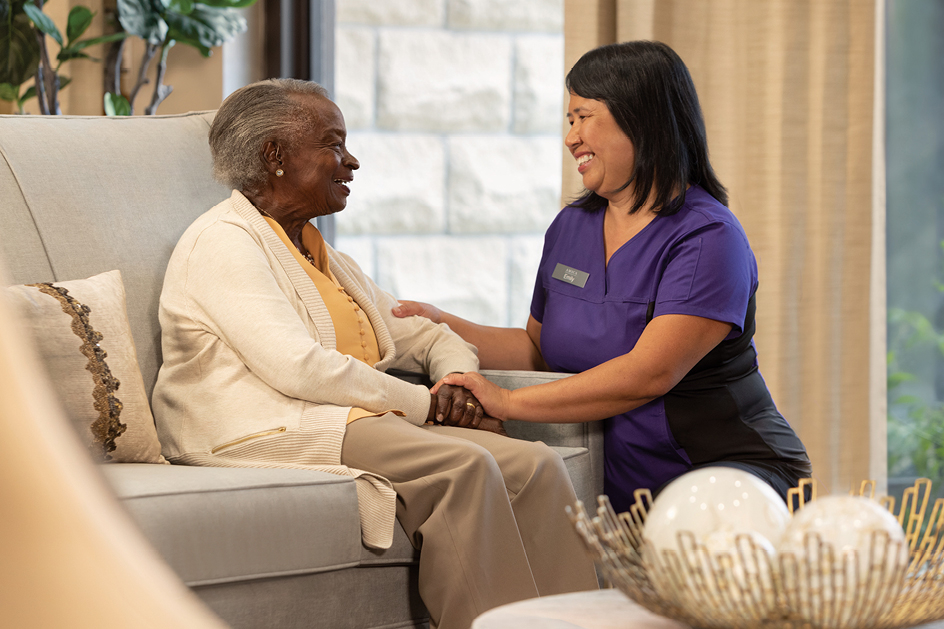
Mental health is vital to overall well-being — at every age. But, in senior-living communities, the emotional landscape is complex. Older adults may experience grief, isolation, or cognitive decline, while caregivers face compassion fatigue and emotional exhaustion.
Supporting residents and team members is essential to creating a healthy, safe, and thriving environment. At Amica Senior Lifestyles, a proactive approach to mental wellness is part of everyday culture.
We spoke with Laurie Neave and Deborah Matheson, regional directors of People Development, and Junior Aning, director of wellness at Amica Whitby, about how mental health is prioritized, from staff training to meaningful resident connection.
Supporting caregivers: mental health strategies for senior-living teams
Laurie Neave: Our role is to provide advice and counsel to leaders navigating situations such as developing effective return-to-work strategies after a leave of absence as well as helping to facilitate safe and healthy workplace strategies overall.
It’s being mindful of the health and well-being of our team members at every stage and being an advocate and role model for this behaviour.
Deborah Matheson: We play a strong role in helping support the mental health of our leaders and our direct-service team members, particularly in the care industry. It’s hugely important due to the high stress level, emotional impact and potential for burnout.
When we address mental health, we help our team members become better equipped to provide quality care to our residents.
Destigmatizing mental health in the workplace
LN: As HR professionals, we see stress, anxiety, depression and burnout. For us, it’s about understanding how to recognize, support, and guide team members and leaders in removing barriers and offering support.
It’s also about removing stigma — or the fear of dealing with mental-health issues.
DM: Talking about it is a huge part of removing the stigma. Many people shy away from mental-health conversations, especially when it involves anxiety or depression.
At Amica, we’re trying to normalize those conversations so they become a natural part of how we work.
Mental-health resources: training and tools that make a difference
LN: “We use TELUS Health, which offers resources for different situations. Leaders and team members often reach out to us not knowing how to navigate a scenario — sometimes all it takes is a conversation and pointing them to the right support.
Deb and I are certified through the Mental Health Commission of Canada’s ‘The Working Mind’ program. It’s evidence-based training that gives practical skills to reduce stigma in the workplace. We’ve already introduced it to our wellness team and are exploring how to expand it to frontline staff.
DM: We offered this training to our wellness team, because they’re on the frontlines. For many, it was their first time really sharing how they felt. There were tears, but there was also gratitude. That’s the power of opening up a space to talk about mental health.
Culture of compassion: everyday mental-health support
DM: Mental-health support can show up in simple, thoughtful ways. One colleague lost two long-term pets recently — one was 20 years old. It was devastating for her. We supported her emotionally; we also collected money and donated to an animal shelter in her pet’s name. That type of care goes a long way.

How leaders care for their own mental health
LN: “HR can be stressful — you’re on your laptop all day, managing complex issues.
I find ways to disconnect, like walking my dog by the lake or meditating. I also have a solid support system of friends. That connection helps.”
DM: “I’m a huge animal lover; I walk my dogs and volunteer with a rescue. I also love music and humour — and spending time with my grandkids.
It’s important to unplug so you can show up fresh the next day.”
Advice on mental health: what everyone should know
DM: Just as our physical health is unique, our mental health is, too. Some days are good, others not so much — and that’s okay. What matters is recognizing where you are and getting support.
At Amica, leaders are becoming more flexible with time off. If someone’s stressed, we look for ways to ease the load — whether it’s adjusting shifts or offering a different day off.
LN: It’s okay not to be okay. We tell people to check in with themselves, to show themselves compassion, and to reach out for help.
After COVID, many people weren’t taking time off, so we’ve really encouraged leaders and frontline staff to use their vacation. Rest is essential, especially in caregiving roles.
Resident mental health: creating meaningful connections in daily life
Junior Aning: We support the mental health of our residents by building strong, trusting relationships and staying genuinely connected to how they’re feeling day to day.
It’s not just about checking in; it’s about really knowing each person, their history, and what brings them comfort. Whether it’s sharing a laugh or encouraging them to join an activity, we focus on creating belonging and emotional safety.
Caregiver burnout: the hidden emotional load
JA: We show up with love and patience every day, but it can be heavy. Caregiving is emotionally and mentally demanding.
We give a lot, and sometimes we run on empty without realizing it. It’s not always burnout in the classic sense, but it's more like a quiet depletion. We need space, time, and support to take care of ourselves, too.
Self-care strategies for caregivers
JA: As a caregiver, I’ve learned to step away from the demands of work and reconnect with what grounds me.
Supporting my mental health means being present in simple, restorative moments — like spending quality time with my son. Just being with him reminds me of what truly matters and helps me stay rooted in the present.
I also make time for stillness and reflection to reset mentally and emotionally. It’s a wellness strategy that helps me show up fully — not just for the seniors and team I support but for myself as well.
Learn more about a career in wellness at Amica.
